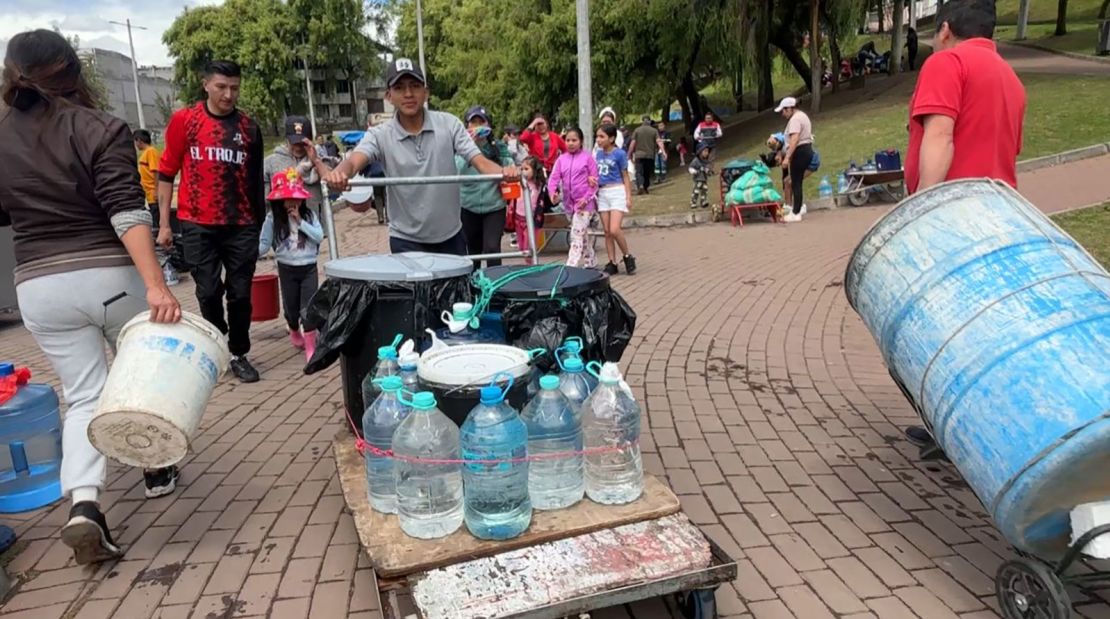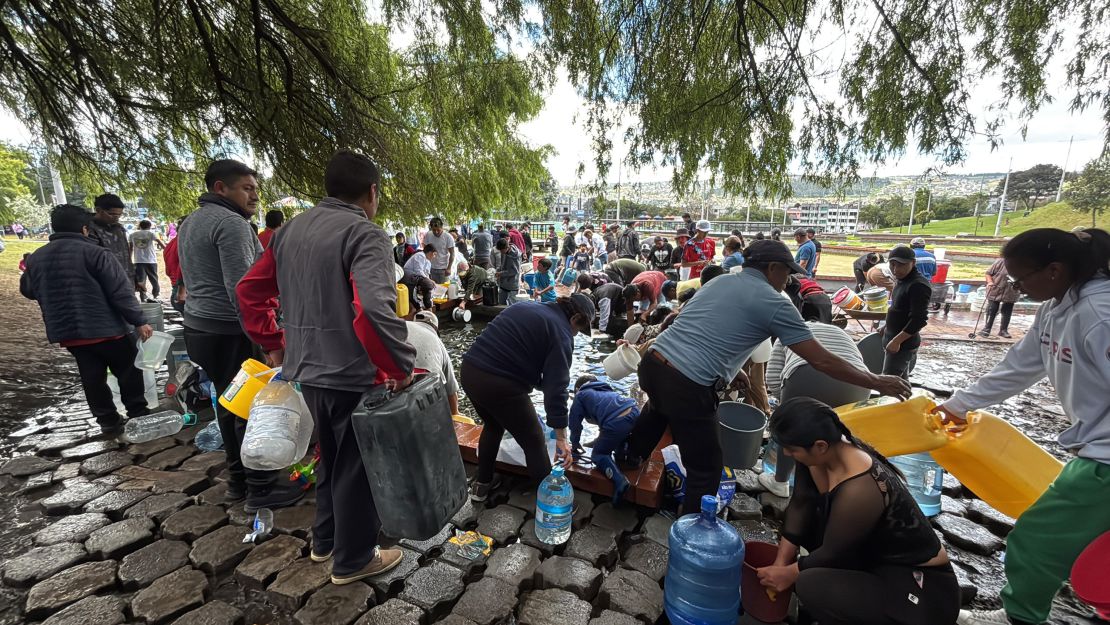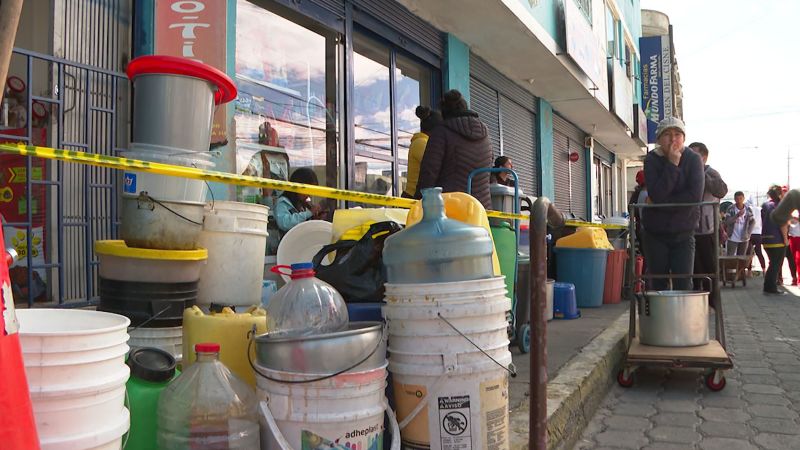Quito, Ecuador
CNN
—
Desperation is mounting in Ecuador’s capital as thousands of people remain without drinking water a week into Quito’s worst shortage in 25 years.
The daily lives of some 400,000 residents have been seriously disrupted by the emergency, which happened after a landslide damaged a pipeline that supplied water to much of southern Quito.
“We can’t live without water!” shout residents of the Chillogallo neighborhood as they line up along a street, waiting for a tanker to deliver water.
Emergency crews have been racing to distribute water supplies to six affected areas and remove sludge from the damaged pipelines, all while officials in Quito city government and national government officials bicker over how to address the crisis.
With buckets, bottles, trash cans and other kinds of containers, residents wait in the street for a water tanker to arrive. Among them is Inés Castro, 74, who sits on a sidewalk under the sun.
“We’ve been waiting in line since morning, and no one has arrived,” Castro said, with tears welling up in her eyes when asked if anyone accompanied her. “I live alone, I’m all alone,” she replies and said she hopes a neighbor will help her carry the bucket home if she manages to fill it.
The municipality has mobilized some 70 water trucks, but they are not enough to serve everyone and don’t always adhere to a schedule.
Erselinda Guilca, who is now retired, says her health is failing and asks for a quick solution to the problem.
“We’re old and can no longer carry heavy buckets of water. We have been here in this cold since morning, hungry. We don’t even have water to bathe,” she said, adding that she would prefer not to have electricity than to be without water, which is essential.

With a plastic washbasin and a pot from her kitchen, Elsa Sarango joins the neighbors’ protest while waiting in line for the water truck.
“If we were young, we wouldn’t mind carrying it; this is very heavy. I just ask for a little water,” she said. She insists that as the days go by, the sanitation and hygiene needs in her home increase. “They don’t tell us the exact time. We have to make trips little by little, otherwise, how would we live?”
Elsewhere in southern Quito, people in the Nueva Aurora neighborhood have grown increasingly desperate and are gathering in the central park to collect water from a spring that doesn’t meet sanitary or purification standards.
Residents have to walk several blocks to retrieve this water. Others get there on vehicles and bicycles, and some rent small, homemade carts that are used to transport containers to avoid carrying so much weight.
“At least it works for me to use for the bathroom. My house is four blocks away. There’s no other option, even if the water isn’t drinkable,” a man arriving in a hurry tells CNN.
A bricklayer named Tomás Chiguano says he’s forced to carry water in black garbage bags because he doesn’t have any containers.
“We don’t have trash cans. We’re there carrying it in bags, and sometimes the bags come out torn,” he said.
Chiguano emphasizes that his work as a bricklayer is affected because he lacks water to mix construction materials like cement and sand, which are essential for his projects.
As of Tuesday, the government has installed the first portable water treatment plant in the area to prevent health problems.
Residents of southern Quito who are looking for transportation to reach water distribution points are upset because the shortage is increasing their costs to access this basic service, saying they have to pay transporters to help them move the containers.
“We don’t have water to wash clothes. We’re tired of carrying it. Sometimes we pay $2 or $3 USD for the car to help us,” a woman tells CNN while waiting for her husband to finish.

Meanwhile, María Tipán said she has to make up to eight trips. Her biggest concern is not having water to wash the clothes of the grandchildren she’s raising.
“Seven or eight trips to carry water, and they charge us $5 USD. We don’t even have enough to wash clothes. I have grandchildren who make a mess. Water is getting very expensive, and they’ll charge us the full water bill,” Tipán said.
The municipality of Quito has ordered the deployment of 71 water tankers, five hydrants, five inflatable systems and three fixed water distribution points in southern Quito to address the emergency.
Quito Mayor Pabel Muñoz expects drinking water service to be restored to residents of the six affected areas by Sunday. His office says workers have so far removed 77% of the soil in the area where the landslide occurred.
“This is the most serious water emergency Quito has ever faced, and it was caused by an extreme natural phenomenon. More than 500 people are working daily on this emergency. In the páramo or in the neighborhoods. At dawn, at night, or under the sun,” Muñoz stated.
Tankers from other cities and cantons have joined the efforts to aid and assist citizens. The Association of Municipalities of Ecuador coordinated the deployment of these units to Quito. The national and local governments are meeting separately to address the emergency, which has led to disputes over the management of the response.
The national government has tasked Vice President María José Pinto with supplying and distributing aid to the affected population. The National Emergency Operations Committee (COE) announced the installation of three portable water purification plants at strategic locations with the support of the Ecuadorian Red Cross.
Energy Minister and COE President Inés Manzano criticized the Quito municipality’s response to the emergency and indicated that the Ministry of Environment recently requested a crisis plan, which, according to the official, was not submitted.
“And in fact, we have insisted that they provide us with a technical report on what happened and what activities they will carry out to complement it. Since there hasn’t been such truthful and timely communication, we have intervened,” she said.
Meanwhile, Mayor Muñoz questioned the lack of fluid communication with the national government. “Why hasn’t there been contact with the Municipality? Why haven’t they been present at the Unified Command Post?” he said.
The government has asked the municipality for greater cooperation to resolve the problem as quickly as possible.
President Daniel Noboa has not yet commented publicly on the water crisis. In recent days, various social sectors and labor unions have protested Noboa’s lack of attention to social policies, as well as certain laws passed by the national assembly.
Noboa, who won reelection earlier this year, has been focused largely on national security issues, including a massive crackdown on violent criminal groups.

